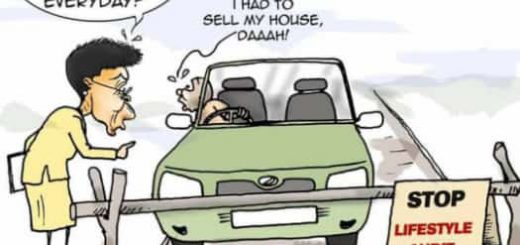The Corruption and kickbacks at UNRA and KCCA that are responsible for the high cost of Road Construction in Uganda

KCCA offers above market value salaries making jobs within it highly lucrative and sought after. The Inspectorate of Government estimates that more than eighty percent of jobs in local government are sold to the highest bidder or to powerful people in government and the private sector. It is no surprise that KCCA is the destination of choice along side NSSF and Umeme for the children of the connected and powerful. As a result of not prioritizing merit and professionalism KCCA is a cesspool of inefficiency and corruption. We use the example of construction contracts awarded by KCCA to drive our point home.
The unit cost per kilometre on average in Uganda costs between $750,000 and $1m (Shs2.5b to Shs3.5b) while the same in Kenya goes for $300,000 (approximately Shs1b) and $330,000 (Shs1.1b) in Rwanda, a country with a mountainous terrain. Recently it was alleged that KCCA is paying as much 14 billion shillings per kilometer to construct city roads. KCCA denies this figure by alleging that before reaching the UGX 14bn per kilometer claim, those alleging this cost used a wrong formula of dividing the amount available ($288m) by the number of kilometers (69.7km) without considering other aspects of the road works. President M7 is convinced that the exaggerated prices are due to high prevailing corruption in public agencies. We agree with the president that the exaggerated prices are due to corruption, nepotism and incompetence.
Generous financing provisions that allow flexible contract financing rather than fixed price contracts
In Uganda especially in KCCA and UNRA (now Ministry of Works and Transport flexible contracts are king and queen and president. Flexible result based contracts create a situation where the government pays all the expenses incurred by the Contractor to deliver the best possible product. Under this model,”cost overruns and delays are not the contractor’s problem — they are the government’s problem. The government bears the risks of the contractor’s incompetence and fraudulent activity by paying a higher price for the end product than it would pay if it agreed to a fixed price contract. It would tolerable if the contractor delivered a high quality product. However due to corruption and lack of adequate supervision, the contractors in Uganda end up delivering low quality and shoddy work for exorbitant prices. Within a few years the roads are potholed and impassable leading to further government expenditures to repair the road or construct it afresh.
Under a fixed price contract, “it’s up to the contractor to figure out how to operate efficiently by putting in place efficient work methods, adopting new technologies and properly supervising its work force. Adjusting to the fixed-price model is a challenge for most contractors whom have long had the luxury of moving slowly and inefficiently due to the knowledge that the government will pay for the inefficiency. The Contractor is motivated to operate efficiently and effectively because it will reduce costs and increase profits. In efficiency leads to losses that can become unmanageable. Flexible contracts encourage laziness, inefficiency and waste because the contractor is not incentivized to improve it’s work methods to promote efficiency and quality work. The government commits itself to pay regardless of delays and inefficiencies that arise from the contractors negligence and complacency.
Kick backs and work certificates
Any honest contractor will tell you that you should never bid for government contracts given the corruption and victimization in government procurement. Even before a contract is awarded the contractor is expected to grease the palms of those awarding the contract and every stage a contractor has to pay bribes before a work certificate is approved and payment made. By the time work is completed and handed over the contractor cannot break even or turn a profit. Luckily those hands that you grease have at this time helped you double the contractor price thus allowing you to pay more bribes and make a large profit on the contract. The bribes help you hide the shoddy work you executed, keep the noisy investigations away and they get you the next big deal.
Read More
- Ideal Amendments that should be included in the Magistrates Courts Amendment Bill 2026 of Uganda
- President Yoweri Kaguta Tibihaburwa Museveni is a minority President voted by only 7,946,772 (36.7%) out of 21,649,608 eligible Ugandan voters in the 2026 Presidential Elections
- Four years of IGG Beti Kamya drowned the Inspectorate of Government (IG) deeper into oblivion and irrelevancy but it Can be redeemed
- The Proposal to Make Magistrates Grade Ones Chief Magistrates is an efficient use of resources that will improve service delivery in Uganda
- If Magistrates Courts in Uganda are less competent and more prone to corruption does it mean that the poor deserve inferior justice to the rich.


